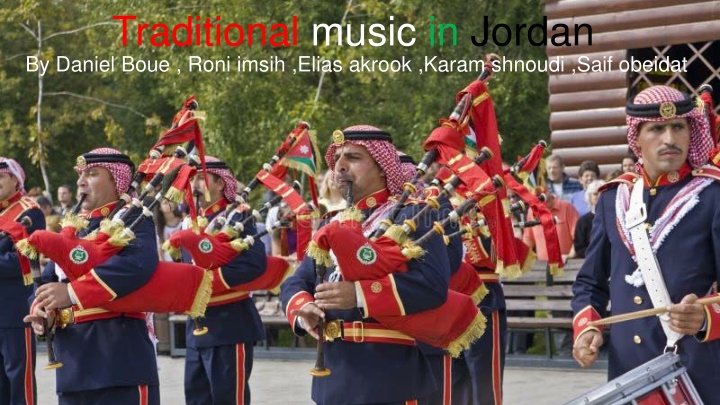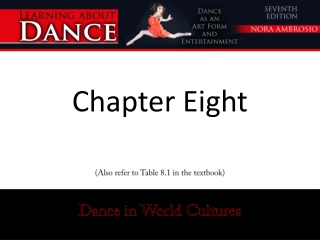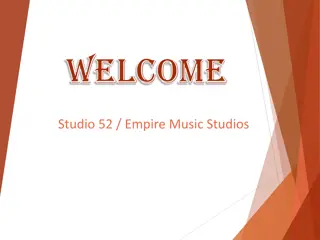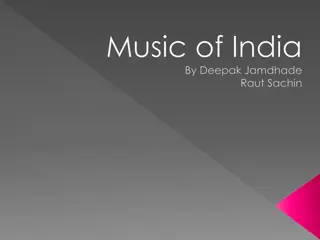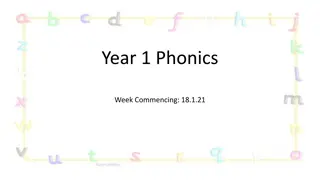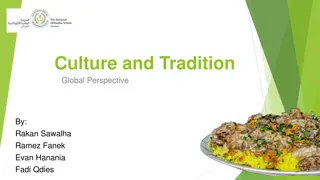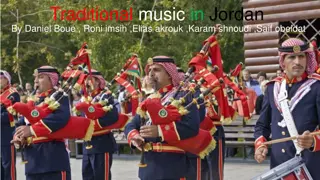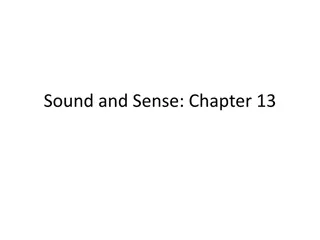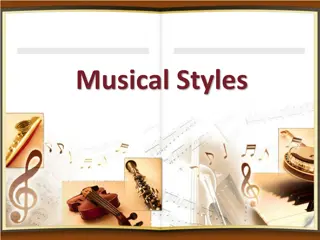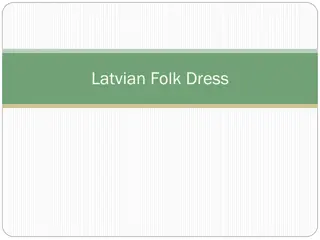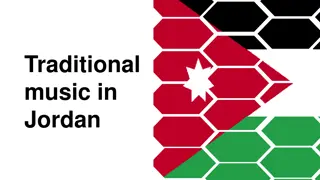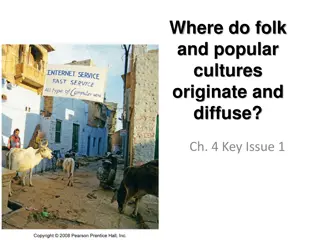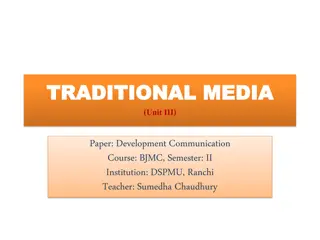Exploring Traditional Music in Jordan: Folk Sounds and Cultural Influences
The traditional folk music of Jordan encompasses countryside, Bedouin, and marine influences, each with unique characteristics and cultural significance. From vibrant countryside songs to the raw melodies of Bedouin music, and the limited yet distinctive marine music in Aqaba, Jordan's musical landscape is rich and diverse. Discover the traditional music instruments of Jordan and delve into the rhythms that define this ancient musical heritage.
Download Presentation

Please find below an Image/Link to download the presentation.
The content on the website is provided AS IS for your information and personal use only. It may not be sold, licensed, or shared on other websites without obtaining consent from the author.If you encounter any issues during the download, it is possible that the publisher has removed the file from their server.
You are allowed to download the files provided on this website for personal or commercial use, subject to the condition that they are used lawfully. All files are the property of their respective owners.
The content on the website is provided AS IS for your information and personal use only. It may not be sold, licensed, or shared on other websites without obtaining consent from the author.
E N D
Presentation Transcript
Traditional music in Jordan By Daniel Boue , Roni imsih ,Elias akrook ,Karam shnoudi ,Saif obeidat
introduction The traditional folk music of Jordan can be distinguished from that of its neighboring countries like Syria and Saudi Arabia by its strong Bedouin influence. They are classified as Countryside music ,Bedouin music ,and Marine music.
Interview on Jordan TV https://www.youtube.com/watch?v=5DBVq0vRYhw
1.Country Side Music It is a traditional folk that is spread in the countryside, cities and towns of Jordan, especially in the north and centre of Jordan, in fact this singing has entered all Jordanian cites with strength. The Songs of the countryside were faster and more graceful than those of Bedouin cities due to the Moving Rhythm of life in it's Seasons and Occasions. The majority of rural musical forms are preformed collectively, accompanied by folk dances (dabke), which are spread across Jordan and mastered by vast majority of Jordanians.
2.The Bedouin music This is the singing that pertains to the human groups inhabiting the Jordanian dessert. Bedouin singing is characterized by The lack of rhythm and melody and decorations. Most dessert singers tend towards a high sharp voice with nasality in terms of outlet and a quick monotonous due to the isolation of the city. The countryside preserved the authenticty of ancient Arabic singing through a valuable and important group of Bedouin. The most important singing forms are: The Hada, the Hijin, the Shoroqi and the Qasid (Samer) There is a dance that accompanies the Samer of Qasid in which the men dance in circle and the Hashi (the women who dance with a sword in the middle of Samer's circle) participate with them.
3.Marine music Marine music is very limited in Jordan due to very limited marine area overlooking the Red Sea in the city of Aqaba. The singing there is accompanied by a very distinctive rhythms derived from waves of the sea with the use of semsemie instrument
Traditional Music Instruments of Jordan
Please watch this first https://www.youtube.com/watch?v=n4b2ccIaf5U
1.Wind musical instruments Wind musical instruments are defined as the most common traditional instruments in Jordan. They are instruments from which sound is produced by the passage of air through their parts. Wind instruments are considered the first musical instruments known to man in history, as the winds that passed between the holes in the wood of trees, rocks and bones produced a whistle that caught man s hearing and made him later benefit from it. .
In making primitive models of monophonic wind instruments that he used to simulate the sounds of nature, he later came up with the idea of making holes in tubes to extract several sounds from a single tube. With the passage of time and the development of human civilization, these models continued to develop until they led to the creation of wind musical instruments that still exist to this day. Jordanian people have known, since ancient times, musical instruments, in their manufacture, development and performance, and historical monuments indicate the importance of music in ancient Jordanian civilization.
Gerbeh, or bagpipes, is a woodwind instrument with enclosed reeds attached to a bag that holds a continual supply of air. Across the Anglophone world, the Scottish Great Highland bagpipes are the most well-known example, but bagpipes have been played for millennia in huge parts of Europe, Northern Africa, Western Asia, the Persian Gulf region, and northern parts of South Asia. The gerbeh is used in all traditional Jordanian and folk music and is always present at national events and celebrations.
Mijwiz, meaning dual in Arabic, is a traditional Middle Eastern double-pipe, single-reed woodwind instrument. It is made up of two small bamboo pipes of similar length with reed tips joined together. In the Levant, the mijwiz is used to accompany either belly dancing or dabke. Many popular folk songs feature the mijwiz.
2.Rebab is the term given to a group of related bowed string instruments .It is one of the first known bowed instruments, dating back to the 8th century. The rebab is employed in a wide range of musical groups and genres. Its body varies from being ornately carved, as in Java, to simpler variants, such as the 2-string fiddle of the Nile which may have a body carved from half a coconut shell.
Rebab Famous among the Bedouins
3.Tablah Tablah is a single-head membranophone with a goblet-shaped body that is regarded as the national symbol of shaabi music. While seated, the tablah can be played by holding it under one arm or by laying it sideways on the lap. Some drums can have shoulder straps so that they can be played while standing or dancing. When lightly played with the fingertips and palm, it provides a resonant, low-sustain sound.
Famous in the city of Aqaba
Links https://www.jordanheritage.jo/wind-instruments/ https://www.jordannews.jo/Section-119/Music/Dances-and- instruments-of-Jordan-18718 https://traditionalarabicmusic.com/music_of_jordon.html
